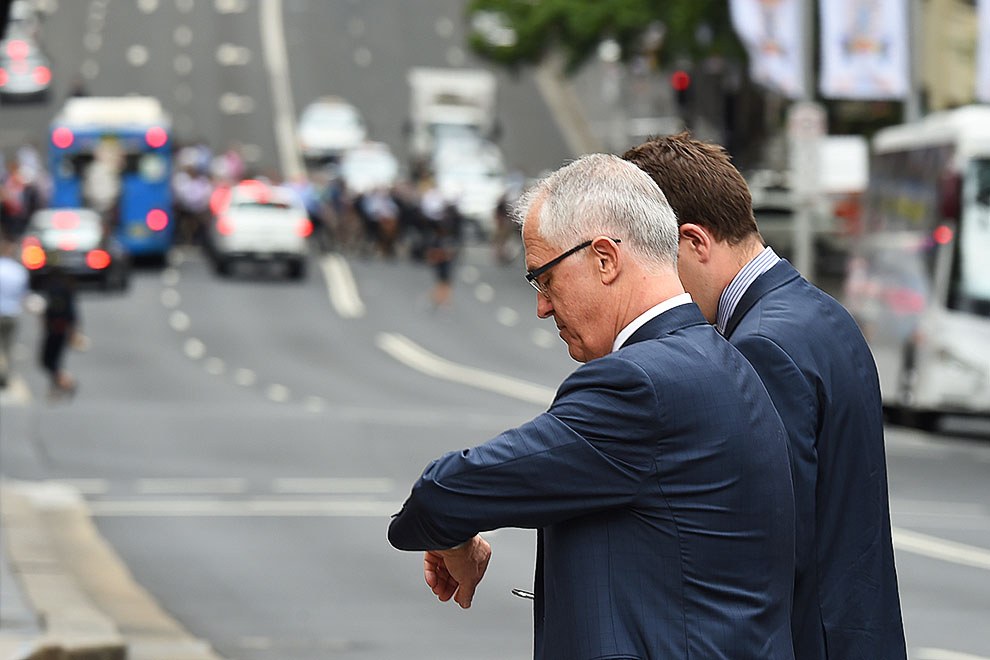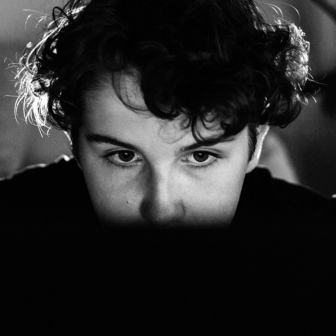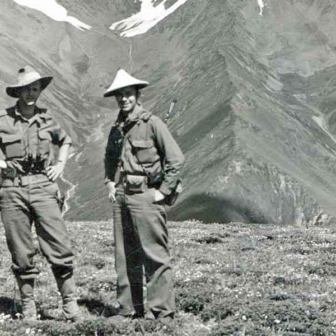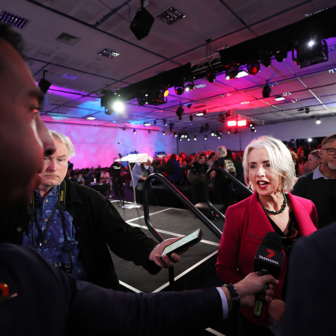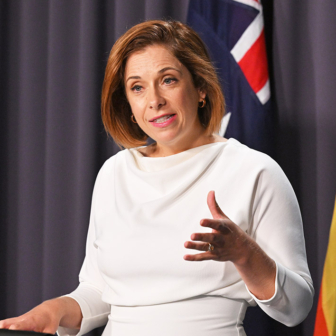Born to Rule: The Unauthorised Biography of Malcolm Turnbull
By Paddy Manning | Melbourne University Publishing | $45
Max Gillies once made our current prime minister weep. Back in 1985, the well-known political satirist performed a sketch on The Gillies Report (a television show, in case you weren’t born then) in which he portrayed the late billionaire and media mogul Kerry Packer as a King Kong–style monster, sporting a long goanna tail, atop a TCN-9 transmitter.
But why the reptilian reference, I hear younger readers cry. Well, once upon a time a royal commission was set up to investigate the activities of the infamous Federated Ship Painters and Dockers Union (motto: “We catch and kill our own”). Somehow this inquiry into union malfeasance, led by straight-as-an-arrow Melbourne lawyer Frank Costigan, expanded into a full-blown investigation of Australian graft, corruption and dodgy tax deals.
Then, one day in 1984, a confidential commission document containing forty-two case studies of allegedly villainous behaviour was leaked to Brian Toohey at the now defunct Fairfax newspaper, the National Times. One case study carried the codename “Goanna,” and it collated a lot of nefarious allegations about an unnamed and very rich Australian who liked a punt. Every man and his dog took a wild stab in the dark at who it might be and came up with the same name: Kerry Francis Bulmore Packer.
Now Mr Packer had on his legal team a twenty-nine-year-old Exocet Missile, otherwise known as Malcolm Turnbull, who was soon launched screaming at Costigan. Turnbull convinced his boss to out himself as the Goanna and let him go after the commission. The result: its reputation took an almighty hit. Most importantly, the Australian Broadcasting Tribunal decided that Packer remained a “fit and proper person” to hold a TV license, and the big man got to keep control of the cornerstone of his business empire, the top-rating Channel Nine. Packer’s faith in Malcolm’s aggressive tactics had been amply rewarded.
Then a blameless comedian cracked a few jokes about these high-profile events and was banned from appearing on Channel Nine for the rest of Kerry Packer’s life. Gillies also had to take a call from the aggrieved party’s legal wunderkind, who told him that “Kerry was very upset by it, and I cried when I saw it. It was beyond the pale.”
Convincing Kerry Packer to out himself as the Goanna, and then loyally defending his boss to the point of lachrymose distress, is just one of many high-octane events in the life of Australia’s twenty-ninth prime minister, as told by Paddy Manning in Born to Rule. Manning paints a portrait of Turnbull that anyone who has been paying attention to Australian public life for the last several decades will recognise: there is Good Malcolm – the nattily dressed Republican who likes dogs and children – and then there’s Bad Malcolm – who shouts at people when they get between him and a bag of money, or a prime ministership.
By all accounts (including his own) Malcolm Turnbull was a precocious child. He was born to a very clever mother, the writer and academic Carol Lansbury, and an – ultimately – very rich father, the hotel broker Bruce Turnbull. Unfortunately it was not a happy family. His parents divorced and his mother moved to New Zealand with a lover, and then to the United States.
Young Malcom went to posh Sydney Grammar, where he shone as an imperious debater and terrorised his fellow students as a hated head boy. At the University of Sydney he studied for a law degree while pursuing a full-time career in the media. To keep up with his studies Turnbull famously kept another student on a retainer as his personal note-taker in the many lectures he couldn’t attend. The note-taker obviously did an excellent job, as Malcolm won a Rhodes Scholarship to Oxford where he studied more law but this time took his own notes.
By the time he returned to Australia in his mid-twenties, Malcolm was renowned as smart, energetic, annoyingly self-confident, tantrum-prone and blessed with the handy knack of lassoing powerful mentors into his orbit. Besides Packer, he also had career-enhancing relationships with Sydney Grammar’s headmaster Alistair Mackerras; his mum’s old university chum, Labor premier Neville Wran; and his father-in-law, former Liberal attorney-general Tom Hughes. Most importantly, he managed to lasso an equally accomplished partner. Indeed, many of the people who know both Lucy Turnbull and her husband believe quite strongly that the wrong Turnbull is running the country.
So what use did Turnbull pursue with these intellectual gifts and useful connections? He turned his inherited fortune into an even larger pile while making a name for himself as a man in a blistering take-no-prisoners hurry.
As a barrister he took on the high-handed remnants of the British Empire in the Spycatcher case, and succeeded in ensuring that a second-rate book by the fantasist and former spy Peter Wright become a worldwide bestseller. He made money as merchant banker in partnership with Wran and Nick Whitlam; and then he made some serious money, mainly by investing in Sean Howard’s internet success Ozemail. It all looks like day after day of smooth sailing, returning home with a wet spinnaker to the obligatory waterside mansion. But there was one area of life where Turnbull did suffer the indignity of a capsize – and on more than one occasion.
Back in 1991 Australia’s current prime minister made this honest self-assessment: “I’m not sure that I’m really suited to the democratic process.” It’s a bit of a problem, really, because politics – and ascending to the nation’s top job – was always Turnbull’s great ambition. Money, and fame, came early and easily, but acquiring political power took a bit of doing.
Paul Keating once observed (in conversation with Kevin Rudd in 2007) that there are three things you need to know about Malcolm’s political skills: he’s brilliant, and he’s fearless, but he has no judgement. It’s a typical Keatingism: harsh but on the money.
And Keating’s assessment, according to Manning, was borne out in June 2009. At a secret meeting in Lucy Turnbull’s “plush office on top of the old post office at Potts Point,” Turnbull met with a senior official from Treasury with a name straight out of Dickens.
Godwin Grech told Turnbull that he had documentary proof of corruption by Kevin Rudd, and the “Utegate” conspiracy scandal was born. And though the whole thing was a crock of ordure, The Man Who Would Be PM spooned it up; every last mouthful. Within a few weeks Turnbull’s shortcut to the Lodge became a fast track into a brick wall. Such a lapse of judgement gave ammunition to his growing band of enemies and by the end of that year Turnbull was given the flick from the Liberal Party’s leadership.
Manning recounts this episode particularly well. It warrants a re-reading whenever the current PM’s reputation is given a fresh polishing in the media.
When Manning first proposed this book to its subject, he was told, “No one would ever write the authorised biography of Malcolm Turnbull… He would do that himself.”
As a student of Australian politics I look forward to reading Malcolm on Malcolm. But I also look forward to new editions of Manning’s version of the great man’s life – and I suspect there could be several of them.
In the first instance, Manning deserves the chance to make this an even better book. Given how quickly it was written, Born to Rule is a miracle of coherence, but unfortunately it does contain some hard-to-miss errors. Kerry O’Brien wasn’t the presenter of ABC TV’s Lateline in 2006, for example.
It also occasionally suffers from the type of writing that seeps into a text between the author’s sixth strong coffee and 2 am. At one point Manning writes that “Turnbull had nailed himself to the Packer mast” – which sounds both painful and inexact. Normally you either nail “your colours to the mast” as a sign of your unwavering allegiance, or you “tie yourself to the mast” so you can listen to the sirens’ song without foundering on the rocks. Something is being crucified here, but I don’t think it’s Malcolm Turnbull.
Manning’s publishers have also let him down by producing a hardback that retails for over forty bucks and doesn’t contain any pictures of Malcolm in action. Future editions should rectify this as well. And future editions will be necessary, surely, because Malcolm Turnbull’s career is just getting started. Barring injury or illness, we are very likely to have prime minister Turnbull reigning over us for some time.
For a start, he faces an opposition leader who hasn’t looked comfortable at the crease since Tony Abbott was politically shivved by his own party. Even the notoriously fickle Labor Party is unlikely to topple Bill Shorten before next year’s election. It will let the last remaining guilty player from the Rudd–Gillard–Rudd fiasco stagger off to the outdoor dunny and take the long drop into electoral oblivion – and then get on with life under a new, less tainted, leader.
Until he gets the legitimacy that an election victory confers, though, the sharpest arrows heading Malcolm’s way will be from his own side of politics. The Liberal Party’s most successful leaders have all been comeback kids. Robert Menzies was a much better PM the second time around, after he had been violently dumped by his colleagues for being an arrogant prat. John Howard famously described himself as Lazarus with a Triple Bypass – and was a wilier, more effective, PM as a result of his unexpected political resurrection. Both of them learnt how to control and massage their own party, and keep on side with their Coalition partners from the Bush.
Can Malcolm learn from his own mistakes, and from their example? Or is he still unsuited to the strange disciplines of the democratic process? •
